Provo, UT – BYU Museum of Art
Phoenix, AZ – Phoenix Art Museum
Belfast, Northern Ireland – Ulster Museum
Stockholm, Sweden – Nationalmuseum
Slow Art Day Presentation at HTHIC Heritage & Slow TourismLAB, 27 Oct 2021

On 27 October at 14.00 CET / 8.00 AM EST, the Heritage & Slow TourismLAB will be focused on Slow Art and slow looking.
Maggie Freeman, Global Coordinator for Slow Art Day, will give a presentation focused on the history of Slow Art Day, its design philosophy, and the future of Slow Art Day. Long-time Slow Art Day host Armand Storck of Sint-Pauluskerk in Antwerp will also share insights and experiences from organizing Slow Art Day events.
The Heritage & Slow TourismLAB is a spin-off of the Heritage, Tourism and Hospitality, International Conference (HTHIC). In the LAB, an independent think tank, researchers, professionals and policymakers explore the varying meaning and practices of Slow and Slowness and ways to preserve natural and cultural heritage thanks to and despite tourism.
If you are interested, we hope you will join the LAB to learn about and discuss applications of Slow Art Day and slow looking within the context of cultural heritage and tourism. How can we apply Slow Art and slow looking to heritage sites? What are critical success factors? Is slow looking the same as mindfulness? Can it be instrumental in the preservation of natural and cultural heritage?
Register here.
Slow Art and Mindfulness with the Art Gallery of Ontario
For their 7th Slow Art Day on April 10th, the Art Gallery of Ontario (AGO) in Toronto, one of Canada’s largest art museums, shared a video and five artworks from their collection to their social media platforms, Facebook, Instagram, and Twitter.
A couple of days before the event, AGO uploaded a slow looking video featuring Clarence Alphonse Gagnon’s ‘Study of a Hare in Winter’ (1922), with a slow looking and mindfulness exercise guided by Melissa Smith, Assistant Curator of Community Programs.
On the actual day of the event, participants were then invited to focus on each of these five artworks for 10 minutes:
- Kazuo Nakamura, Blue Reflections, 1962
- Abraham Anghik Ruben, Sedna, c.1990
- Vilhelm Hammershøi, Interior with Four Etchings, 1904
- Julie Mehretu, Algorithms, Apparitions and Translations, 2013
- Christi Belcourt, Wisdom of the Universe. 2014
They were also encouraged to leave comments under each image.
Below are images of the artworks, which we encourage you to experience slowly using the AGO’s prompts that follow.
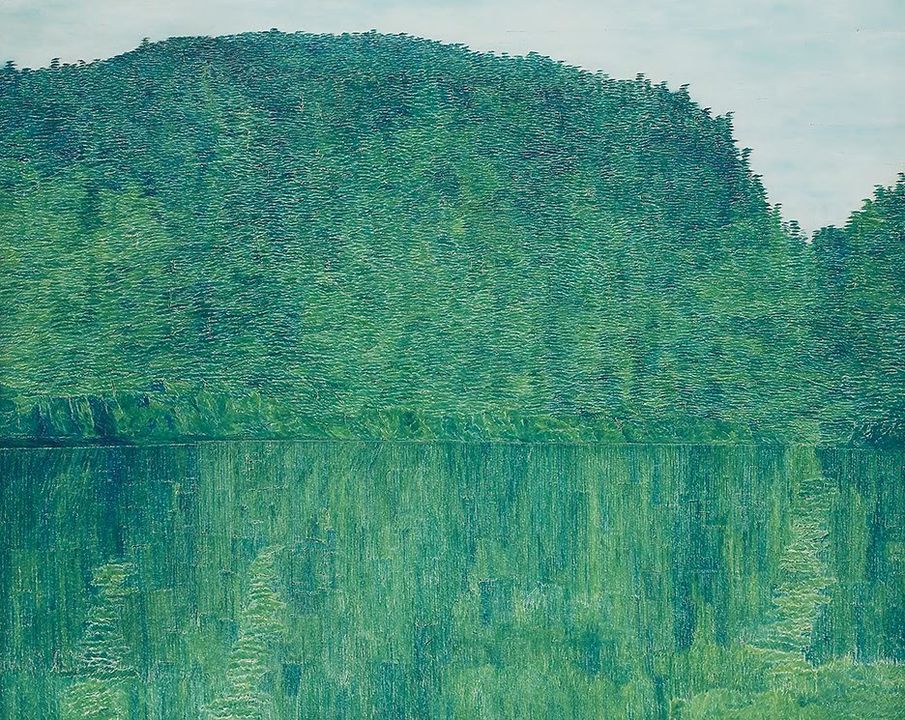
oil on canvas, Overall: 101.7 x 127 cm. Purchase, with funds from the Peter Larkin Foundation, 1962. © Art Gallery of Ontario 62/8
Prompts for Kazuo Nakamura
For this Kazuo Nakamura piece don’t just look slowly, look closely. See how subtly the colours change. Pay attention to how the gradual shifts in brushstrokes give a sense of movement to the landscape. What do you notice about how the brushstrokes are applied? Each and every brushstroke is calculated and purposefully applied. Nakamura is best known for this analytical approach in his paintings, and in his later works, he was influenced by mathematics and scientific theories. He sought to discover a universal pattern in art and nature. What do you think this universal pattern would look like? Do you prefer an analytical approach or a more gestural one?
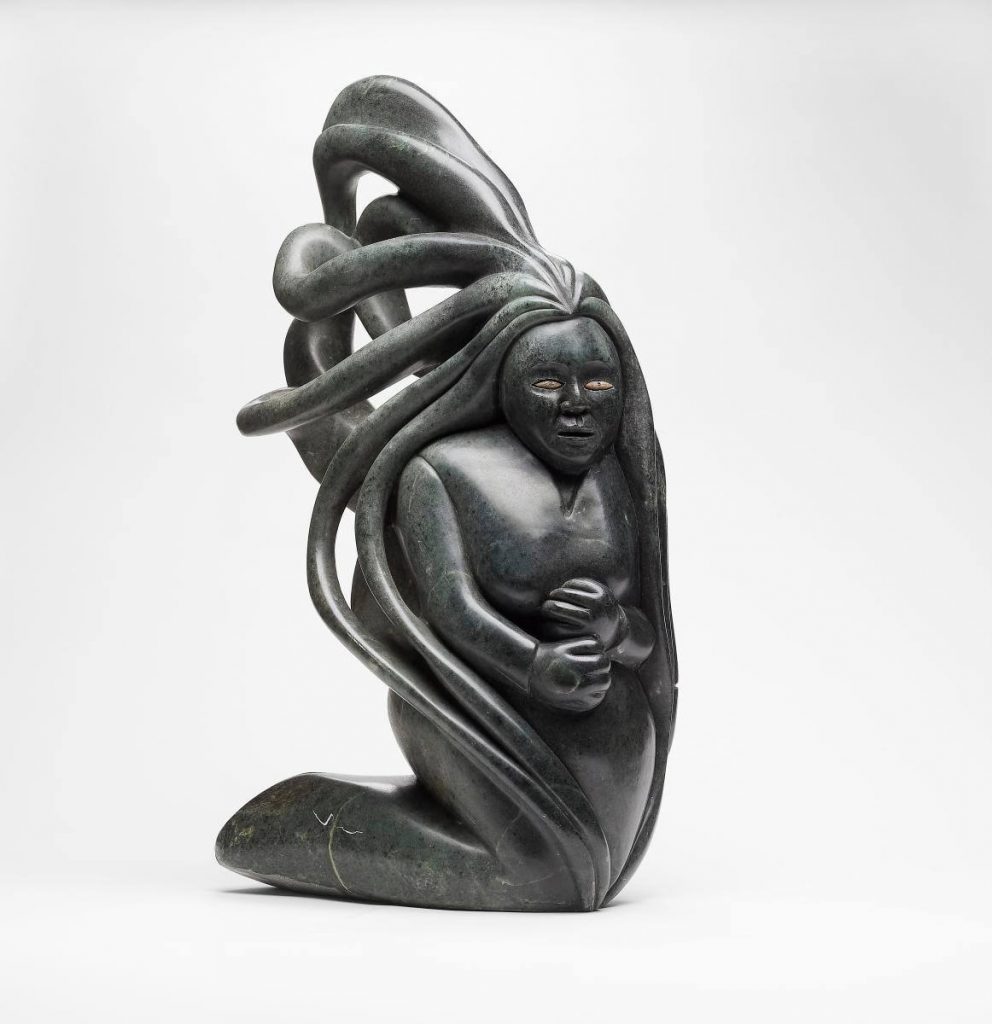
mottled dark green Brazilian soapstone, inset stone eyes, Overall (approx.) 70 × 35.5 × 18 cm. Gift of Samuel and Esther Sarick, Toronto, 2001. © Abraham Anghik Ruben. 2001/400
xxxxxx
Prompts for Abraham Anghik Ruben
Abraham Anghik Ruben is a storyteller and tells his stories through the medium of sculpture. His sculptures often tell the legends, myths, and spiritual traditions of the Inuit people and the Arctic land. A recurring figure in Ruben’s works is the Inuit Sea Goddess, Sedna. Look at how her hair dramatically but gracefully arches up behind her like it is flowing with the movement of water. Notice how her eyes stand out from the rest of the sculpture, and how she clutches her hands close to her torso. What do her expression and her posture suggest? What is the message Ruben is trying to share?
xxxx
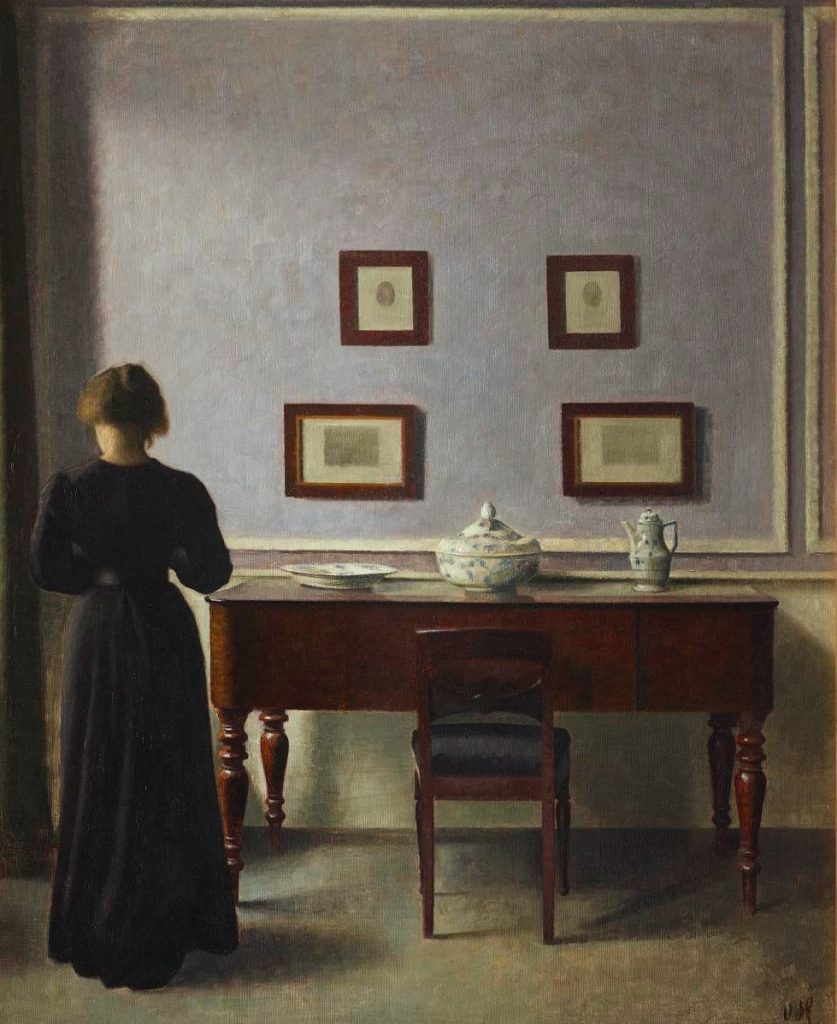
oil on canvas, Framed: 74.7 × 63.6 cm.
Purchased with the assistance of a Moveable Cultural Property grant accorded by the Department of Canadian Heritage under the terms of the Cultural Property Export and Import Act, 2015; © Art Gallery of Ontario. 2014/1054
Prompts for Vilhelm Hammershøi
Looking for a little calm and quiet? Come and join us in Vilhelm Hammershøi’s “Interior with Four Etchings”. A muted scene in both colour and sound, we invite you to hush the world around you as you spend some time with this piece. The female figure is the artist’s wife, Ida. Since she has her back to us, we cannot read her expression. But because she is turned away, we can enter and explore this private space freely. Take a look around. Notice how the light softly enters from the left, creating reflections on surfaces and depth in the space. Where do your eyes go? To the items on the table? To the etchings on the wall? What are the etchings of? Look closely because there are details here that could have easily escaped you before.
xxxxx
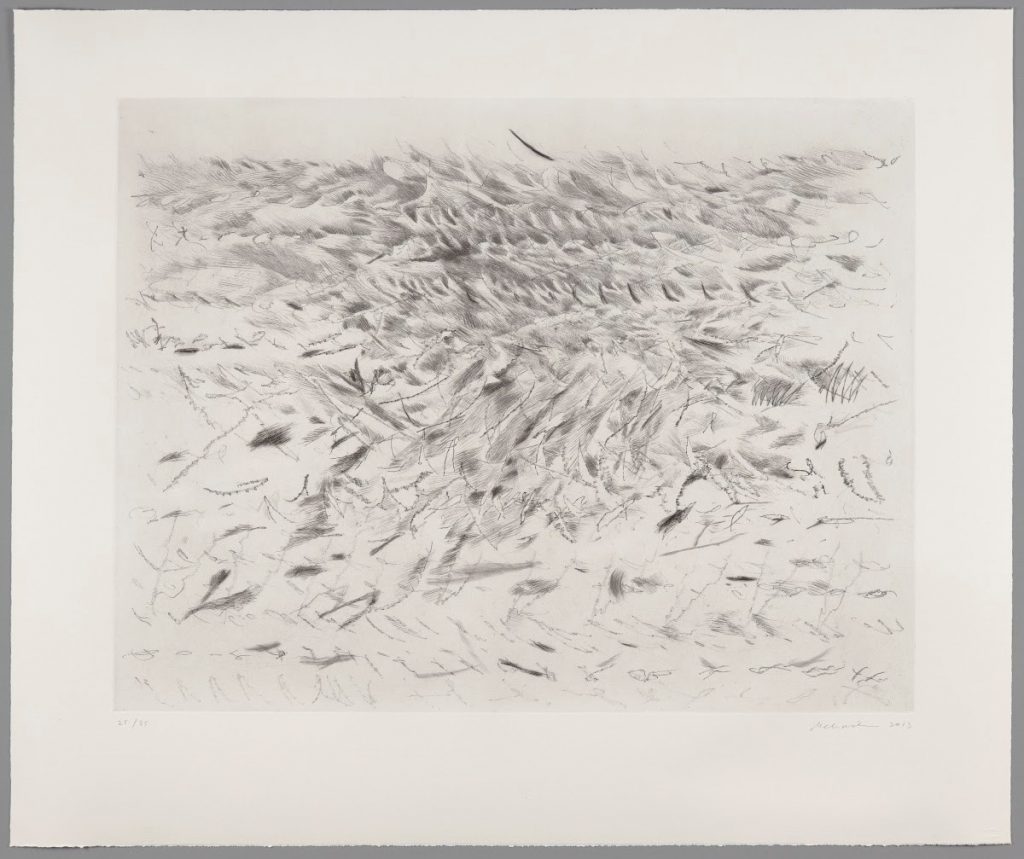
One of a suite of five etchings. Etching with aquatint, spitbite, soft ground, hardground, drypoint and engraving in black ink on paper. Sheet: 79.4 × 94.8 cm. Purchase, with funds from the Trier-Fodor Fund, 2019. © Julie Mehretu, courtesy Marian Goodman Gallery. 2019/2322.1
Prompts for Julie Mehretu
There’s no piece quite like this Julie Mehretu that demonstrates the importance of an unhurried and patient approach to art. Mehretu is inspired by landscapes, cities, and human activity within nature. Particularly interested in layered imagery, Mehretu’s printmaking technique requires her to slow down as she layers line upon line to create this surreal landscape. Take a look, what do you see? Now, look closer. Even closer. The closer you look the more details you’ll see. The larger narrative will begin to fall apart, revealing various smaller narratives beneath. Just as the piece evolves with each of Mehretu’s lines, your experience of this work will also evolve over time. So, go on. Look again.
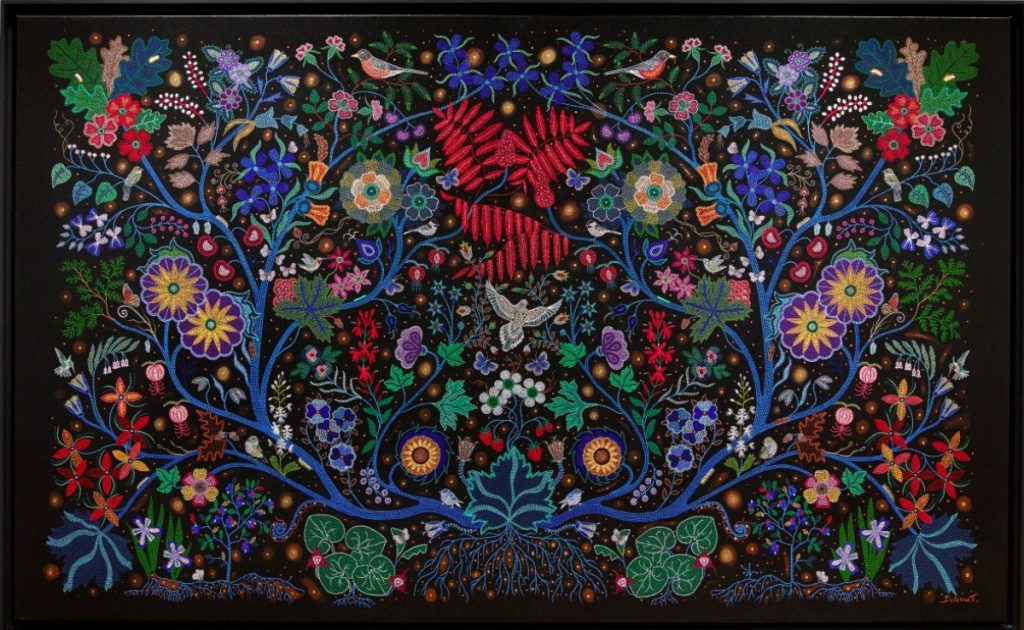
Acrylic on canvas, unframed: 171 × 282 cm. Purchased with funds donated by Greg Latremoille, 2014. © Christi Belcourt 2014/6
Prompts for Christi Belcourt
Ten minutes is hardly enough time to contemplate the wisdom of the universe, both the concept and this piece by Metis artist Christi Belcourt. Take your time to really explore this piece. What type of birds do you see? What type of flowers and vegetation can you recognize? Imagine yourself in this space. Move through the branches and notice the balance and harmony. Can you hear the sounds of the animals? Can you smell the flowers around you? See how everything is connected. This great network of life. Belcourt’s piece asks us to reflect upon the well-being of all living species on this earth, as the current climate crisis affects us all. Take a deep breath, and surround yourself with the wisdom of the universe.
xxxx
The event was well received, with 10,000+ likes and views on the AGO’s social media platforms.
Below are some great quotes form participants:
This is my favourite painting at the AGO! I always spend a long time in front of it and always pick up something new each visit.
Participant’s comment under Nakamura’s painting – Instagram
Love this idea!!
Participant’s comment on Instagram
We appreciate the Art Gallery of Ontario’s thoughtful design for this multi-day virtual event, and look forward to what they come up with for Slow Art Day in 2022.
Johanna, Ashley, Jessica, and Phyl
